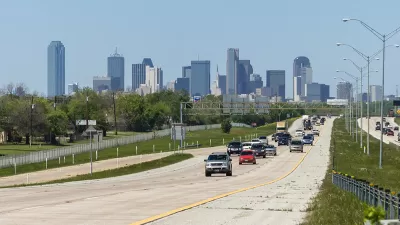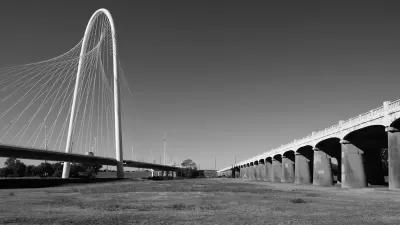Dallas reached another milestone in its years-long battle over a proposal to build a toll road through a park along the Trinity River on the edge of downtown. The latest version of the proposal so far hasn't cleared any controversies.
"At a meeting of the Transportation and Trinity River Project Committee, 12 of 15 council members heard from urban planner Larry Beasley about his so-called Dream Team’s new plan for the Trinity Parkway," reports Robert Wilonsky, who also offers a critical opinion of the results of their work: "which still looks and feels and sounds a lot like the highway everyone hated so much that Mayor Mike Rawlings called for this do-over."
After a year of work by a collection of planners and engineers, along with an appointed advisory committee, the Dream Team produced the following conceptual proposal:
The road will be four meandering lanes. Traffic will move at 45 miles per hour. There will only be a handful of on-and-off ramps. There will be trees everywhere. There will be U-turns and shoulder pull-over spots for those wanting to enjoy so-called “WOW” views. There won’t be trucks. There won’t be tolls. There will be park access.
Except Wilonsky remains skeptical that the talking points offered by the Dream team will live up to the reality of the proposal, if the proposal should be realized. Wilonsky writes:
Because, you see, that meandering road really doesn’t meander. And the lanes are wide and only getting wider — from 10 and 11 feet discussed last year to 11 and 12 feet in the latest iteration. And the proposed grass shoulders will probably wind up being gravel.
Wilonsky offers additional details about the park planning occurring concurrently as the road planning, and also previews potential next steps for the so-called "Dream Team."
FULL STORY: Wilonsky: The Dream Team’s Trinity Parkway still looks like nightmare toll road everyone hated

Maui's Vacation Rental Debate Turns Ugly
Verbal attacks, misinformation campaigns and fistfights plague a high-stakes debate to convert thousands of vacation rentals into long-term housing.

Planetizen Federal Action Tracker
A weekly monitor of how Trump’s orders and actions are impacting planners and planning in America.

Chicago’s Ghost Rails
Just beneath the surface of the modern city lie the remnants of its expansive early 20th-century streetcar system.

Bend, Oregon Zoning Reforms Prioritize Small-Scale Housing
The city altered its zoning code to allow multi-family housing and eliminated parking mandates citywide.

Amtrak Cutting Jobs, Funding to High-Speed Rail
The agency plans to cut 10 percent of its workforce and has confirmed it will not fund new high-speed rail projects.

LA Denies Basic Services to Unhoused Residents
The city has repeatedly failed to respond to requests for trash pickup at encampment sites, and eliminated a program that provided mobile showers and toilets.
Urban Design for Planners 1: Software Tools
This six-course series explores essential urban design concepts using open source software and equips planners with the tools they need to participate fully in the urban design process.
Planning for Universal Design
Learn the tools for implementing Universal Design in planning regulations.
planning NEXT
Appalachian Highlands Housing Partners
Mpact (founded as Rail~Volution)
City of Camden Redevelopment Agency
City of Astoria
City of Portland
City of Laramie




























